JFK set the precedent of being the first Catholic president and the youngest elected president of the United States (43), going down in history as an icon of his generation and leaving his phrase (”ich bin ein Berliner”) as an inheritance for subsequent generations.
By Germán Gorraiz López, Political Analyst
Endowed with an undeniable personal charisma, telegenia and power of the word, with the invaluable help of the first lady Jackie, JFK will leave a unique imprint on the Pamplona decoration of the White House and the hieratic American presidential life (recalling the spirit of Camelot) thanks to its glamour, personal independence and the extraordinary media impact of its travels and public interventions.
Thus, the famous Kennedy-Nixon television debate of 1960, in which 70 million viewers witnessed the first presidential debate broadcast on television in the history of the United States, would mark the beginning of the use of audiovisual media by the presidential candidates through the media impact to make up for the voters’ lack of knowledge of their electoral program or the simple nonexistence of it.
Likewise, it would represent the transition from the end of the postwar period to the dawn of globalization, applying Keynesian measures as a balm against the economic recession that he will receive as an inheritance (5 million unemployed at the beginning of his mandate), measures that, however, will be clearly ineffective and will favour in most cases to the upper classes (tax reduction).
On the other hand, his undeniable attraction to Foreign Policy led him to choose as vice president a southern politician with proven experience to counteract his youth and political inexperience, the senator from Texas (Lyndon B. Johnson), who would take care of the domestic tasks and must assume the presidency of the country for tragic reasons as well as crystallize the unfinished initiatives of his predecessor in a subsequent presidential term, (Law on Immigration and Nationality, promoted by Edward Kennedy (1965), incidentally condemning the political ostracism of the Republican party immersed in internal struggles.
Kennedy-Israel disagreements
Despite Kennedy having the explicit support of the Zionist lobby to achieve his presidential election (he received $500,000 for his campaign and 80% of the Jewish vote) and after intervening before AIPAC to guarantee the traditional unconditional support of the United States to Israel as well as authorizing the first major sale of American arms to Israel in 1963, his tenure was characterized by a cooling of his relations with Ben Gurion.
Thus, Laurent Guyénot, in his article ”Kennedy, the lobby and the bomb”, (Voltaire Network, 2-5-2013), affirms that since the beginning of the 1950s, the Israeli Prime Minister, Ben Gurion, had undertaken the secret manufacturing of atomic bombs, thus distorting the original purpose of the peaceful cooperation program ”Atom for Peace”, initiated during Eisenhower’s mandate.
According to Guyénot, Kennedy’s objective was not to prevent Israel from having nuclear weapons but was part of a much more ambitious project, which he had already announced on September 25, 1961, before the UN General Assembly: ”These weapons must be liquidated before they liquidate us”.

Since in the 60s only the USA, USSR, France, and Great Britain, as well as their NATO and Warsaw Pact allies, had nuclear weapons, countries that, following the dictates of the United States and the USSR, were already determined to implement the doctrine of nuclear disarmament. This thesis was not shared by Ben Gurion who secretly worked against the clock to achieve it despite Kennedy’s frontal opposition.
Furthermore, Kennedy had committed himself in favour of the right of return of the 800,000 Palestinians expelled from their homes and villages in 1948 (nakba), for which the US delegation to the UN presented a proposal on November 20, 1963. implementation of Resolution 194, although he no longer had time to compare the reactions of the Israeli Government since he was assassinated two days later.
This Assassination gave Israel the green light from President Johnson to complete its nuclear project, although it had to wait until 1986 for it to be reliably demonstrated that Israel had secretly obtained the atomic bomb (1967), thanks to the publication by the Sunday Times of several photos. Of the secret Dimona nuclear complex taken by Israeli technician Mordechai Vanunu.
Kennedy, the bête noire of the establishment
Until Eisenhower, the CIA was only the central intelligence organization for the United States government. It was behind multiple tasks of training insurgents and destabilizing governments contrary to Pentagon policies. Still, the financial lobby and the military industry (both engulfed by the Jewish lobby) could not resist the temptation of creating a de facto government that manipulated the ins and outs of power, leading to the appearance of a new entity refractory to public opinion and the control of the Congress and Senate of the United States ( the parallel CIA).
Thus, one year before the end of his mandate, President Ike Eisenhower gave a speech premonitory of the subsequent mutation of the initial ”Campus” to the shadow government that currently protects American democracy and to which all Presidents are hostages. Democratically elected:
”In the councils of government, we must be alert to the acquisition of illegitimate influence, whether or not projected by the military-industrial complex. The risk of the development of usurped power exists and will persist, but we will never allow the weight of this conjunction to threaten our freedoms or democratic processes”.
Consequently, his successor, JKF, began his mandate by taking over from the legendary Director General of the CIA, Allen Dulles, and also attempted to replace the legendary Hoover of the FBI with Edward Kennedy and disinfect the establishment from the pathogenic viruses inoculated by pressure lobbies, in a vain attempt to achieve the enthronement of the kingdom of Camelot for several generations after the nomination of Robert Kennedy as Attorney General.
Kennedy was aware of the difficulty of fighting against the CIA. This organization would be ”de facto” the true holder of shadow power as it was deeply entrenched in all the power apparatuses of the United States. And that he would have declared President Kennedy as his ”black beast” after the well-known fiasco of the Bay of Pigs invasion (April 1961) and the outcome of the Missile Crisis (Cuba, 1962), in which the negotiations between Khrushchev and Kennedy they annulled the CIA plan to invade the Island.
Thus, in a speech at Columbia University on November 14, he admitted that ”there is strong pressure from powerful groups in the USA to convert the position of President into something merely figurative” and thus on November 21, 1963, he was forced to sign executive order 11490, ”which allows the government to take exceptional measures in case of emergency, even for any dictatorship.”
Despite everything and faithful to his rebellious spirit, he continued with his crusade to reconvert the CIA into an apparatus controllable by political power, and shortly before leaving for Dallas, he commented to his close advisors: ”We have to confront the CIA… .”, and on the same day, a secret emissary from Kennedy began the first negotiations with Fidel Castro to reach a pragmatic and acceptable solution for both parties.
This represented a clear order to the anti-Castro exile and the CIA, so its leaders proceeded to the gestation of an endogenous plot that was responsible for the Coup against the democratic legality of the American political system that culminated in the Dallas Assassination (Texas, 1963).
This plot would be an authentic work of labyrinthine engineering that would have the aforementioned CIA and the Israeli Mossad as brains and as necessary collaborators in the anti-Castro exile in Miami as well as Hoover’s FBI, which had as collateral damage the birth of a political system supervised by the ”Shadow Power”.
Since then, all successive US Presidents elects have been held hostage (according to the confession allegedly made by Israeli Prime Minister Ariel Sharon to the then Foreign Minister Shimon Peres in October 2001: ”We, the Jewish people, we control the United States, and the Americans know it” and in the process achieving that JKF achieved the weightlessness of the myth.
By Germán Gorraiz López, Political Analyst


